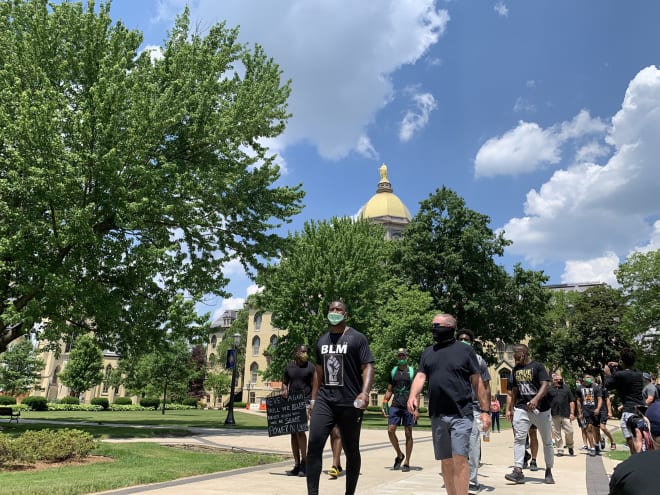Notre Dame Football Leads University In Campus Walk For Unity, Equality
In recognition of Juneteenth and in support of equality and unity, 1,500 members of the Notre Dame community, including 13 varsity head coaches, gathered on Friday at the Irish Green behind the DeBartolo Performing Arts Center to participate in prayer and a peaceful walk around campus. The event was hosted by the Notre Dame football team.
Prior to the walk — which took participants around the stadium, past the library, near Main Building and up Notre Dame Avenue — head coach Brian Kelly, university president Rev. John Jenkins, and players Daelin Hayes, Myron Tagovailoa-Amosa and Max Siegel took the stage to speak on the recent civil unrest in the United States or led those in attendance in prayer.
While there was a somber feel to the event at the start, it was made clear that this was a day for jubilee and remembrance.

“My teammates can attest to this, I speak from my heart,” Hayes said. “One thing that I want to get off my chest that I feel like needs to be said is that the death of Breonna Taylor, George Floyd, Ahmaud Arbery and countless more, we're not here to grieve their deaths but to celebrate and honor their lives.
“We honor their lives through how we make effective change in our community. We honor their lives by how we remain proactive in our activism. We honor their lives by standing for what's right, standing against racism, standing against oppression.”
The event was also a lesson to many of those in attendance on the importance of Juneteenth — a commemoration of June 19, 1865, the day slavery officially ended in the United States — and why it should be observed as a holiday on a more wide-spread scale.
“For all black people of this country, today is our Fourth of July,” Hayes said. “It's our Independence Day, and may it always be recognized as such.”
Even Kelly admitted on stage that he wasn’t aware of Juneteenth until recently.
In the midst of the celebration, those on stage encouraged everyone to continue to push for change when it comes to systematic racism and oppression, which goes much further than the removal of the confederate flag.
It’s improving the public schools in underfunded areas. It’s ensuring all black men and women have access to health care. It’s making fundamental changes to the criminal justice system.
“We want to rejoice the day,” Kelly said. “There's no doubt about having that independence, but we also know of the struggles that we still face today. That's why it's important that when we talked about coming together today, that one of the important elements was the group Black Lives Matters, [which] is important to be here today, as well, because that is the spirit, that is the energy, that is the drive that continues to move change.”
As members of the Fighting Irish program have mentioned before, this type of change and movement must also take place on the Notre Dame campus.
While the university takes pride in the positive impact former president Rev. Theodore Hesburgh had on the civil rights movement and his willingness to stand in solidarity with Martin Luther King Jr., that doesn’t mean there are not issues of racism and inequality on campus today.
Siegel, a junior offensive lineman and walk-on, says he and many other black students at Notre Dame experience hurt from the often insensitive comments and questions they receive from their classmates.
"Black students have an unnecessary burden, an unnecessary responsibility, to explain the mundane ways of living," Siegel said. "You hear countless examples, countless questions. 'How do you get your hair like that? Can I touch your hair?' A lot of these questions can be abrasive. They can even be hurtful to some. Don't get me wrong.
"I'm encouraging everybody: Go out and learn. Educate yourself on what it's like to be black in America, on what it's like to be a black student. However, this responsibility should not be on our own students."
Over the last several weeks, a petition created by The Black Alumni Club of Notre Dame has circulated on Change.org, garnering more than 10,000 signatures.
“I want to amplify what that petition said about education,” Siegel said, pausing due to the gravity of the request he was about to make. “With Father Jenkins present, I want to personally ask that this university looks into implementing a more robust cultural efficacy course.”
Once the speeches were complete, the walk around campus began, with Kelly and Hayes leading the way and the rest of the program following closely behind.
The remainder of the 1,500 people in attendance were encouraged to keep their distance due to the COVID-19 pandemic, but they followed along and kept pace, taking important steps towards change.
----
• Talk about it inside Rockne’s Roundtable
• Watch our videos and subscribe to our YouTube channel
• Subscribe to our podcast on iTunes
• Learn more about our print and digital publication, Blue & Gold Illustrated.
• Follow us on Twitter: @BGINews, @BGI_LouSomogyi, @Rivals_Singer, @PatrickEngel_, @ToddBurlage and @AndrewMentock.
• Like us on Facebook.

